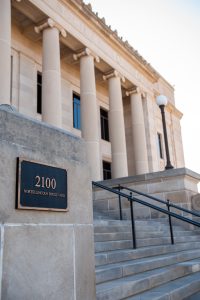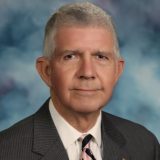Oklahoma Bar Journal
Do Right, Fear Not: Professionalism and the Oklahoma Lawyer
By Justice Steven W. Taylor
 I have some very strict views about ethics and professionalism, and as an old, retired justice, I continue to voice them. I believe the license to practice law is a public trust. Admission to the bar should be strict, strenuous and exacting. Discipline for ethical violations should have one goal: strict, unbending protection of the public and our system of justice.
I have some very strict views about ethics and professionalism, and as an old, retired justice, I continue to voice them. I believe the license to practice law is a public trust. Admission to the bar should be strict, strenuous and exacting. Discipline for ethical violations should have one goal: strict, unbending protection of the public and our system of justice.
Your law license is not a business license. Your admission to the practice of law is not a commercial opportunity – it is a sacred public trust granted upon your oath before the Supreme Court that allows you to walk inside the bar of courtrooms all over this state to represent clients during some of their most difficult times. You hold a public trust. You are an officer of the court. Your law license is granted with one primary mission, and that mission is to uphold the rule of law.
Our country is the only country on Earth that exists because of ideas – the ideas of democracy, freedom and the rule of law. Our nation represents ideas – not a race, not a specific religion – and we must never forget that because we are one of the front-line guardians of the rule of law.
And I ask that you remember history. From the founding of our country, lawyers were there at every step. Every great document in American history – the Declaration of Independence, the Constitution, the Bill of Rights, the Emancipation Proclamation – was the dream and the work and the craft of lawyers. Lawyers were there at every advance in social justice, civil rights and human rights. Lawyers were there at every advance in our nation’s history.
And today, you are needed more than ever. The courts have become more important than ever in resolving disputes; the courts and lawyers have become the adults in the room on so many occasions. When all other institutions fail, the people rely on lawyers and judges to solve all problems.
Our nation is divided on almost every subject: right vs. left, Democrat vs. Republican, MSNBC vs. Fox, urban vs. rural. It has become 50% vs. 50%. It seems that anger has become more pervasive than optimism. We have forgotten how to disagree with one another.
In addition to advocacy skills, judges and lawyers are called to use mediation, settlement and compromise abilities. The courts and lawyers are being called to service more than ever – to repair the breach we find in our communities. Who does your community call upon in times of need, turmoil or problems? It is usually lawyers. Repairing the breach, from the Book of Isaiah, is a part of our calling. Sometimes, we are called to encourage good communication and recognize, as George Bernard Shaw wrote, “The single biggest problem in communication is the illusion that it has taken place.” And in that journey, we must never forget the teaching found in the Book of Micah to do justice, love kindness and walk humbly.
I ask that you remember your clients – those who entrust the most important matters of life to you – they expect and deserve excellence from you. You have no unimportant clients. When you stand in the courtroom with your client, it may well be the most important event in their life. You are their voice – the person they chose to be their advocate. Their life, liberty, fortune and family may be in your hands. It is a public trust. Earn it every day.
Never turn your head away from injustice, never stop believing that you can make a difference. Remember: It has been written, and it is an absolute truth, “Success is never final and failure never fatal.” What matters is your personal and professional courage to do what is right. Lawyers and judges must be armed with courage. John Wayne defined courage as “being scared to death but saddling up anyway.” Thomas Paine defined it as “fear that has said its prayers.”
You must be courageous – have your voice heard. Courage to say things that others may not want to hear. Courage to never bend the truth. Courage to speak for those without a voice, those without wealth or power.
As lawyers and judges, we must all be dedicated to the command of the rule of law, the basic right to a fair trial and due process. One example from my many years as a trial judge was from the Oklahoma City bombing trial. As you will recall, the motive for the bombing was the defendant’s hatred and distrust of our government. At the sentencing hearing, I said to the defendant, “It is ironic that the government that you hate so much is the government that is good enough and strong enough to give you a fair trial.”
But that is just one example of what happens in courtrooms every day across our country. Judge on the bench. Jury in the box. Witness on the stand. Counsel and parties present. Citizens in the gallery. The courtroom in every community of this state is a sanctuary of justice. What happens every day in our courtrooms is a thing of beauty. We must never forget that. Judges, lawyers and jurors doing their work. It is art, and it is just as beautiful as any painting in a museum or any symphony in a concert hall.
That is what we do, every Oklahoma lawyer. Be proud of that; we are all privileged to be a part of it. Never forget that. Remember that the next time you walk into a courtroom.
I leave you with an aspirational goal that you learn to love justice more than you love victory. And I remind you of a command that is inherent in your oath as an attorney: do right, fear not.
Editor’s Note: This article is adapted from Justice Taylor’s keynote speech presented during the OBA Annual Meeting on Nov. 2, 2023.
 ABOUT THE AUTHOR
ABOUT THE AUTHOR
Justice Steven W. Taylor, a native of McAlester, served on the Oklahoma Supreme Court from 2004 until his retirement in 2016. He served a term as chief justice from January 2011 until January 2013. He is currently serving a nine-year term as a regent for the Oklahoma State Regents for Higher Education that began in 2019.
Originally published in the Oklahoma Bar Journal – OBJ 95 No. 1 (January 2024)
Statements or opinions expressed in the Oklahoma Bar Journal are those of the authors and do not necessarily reflect those of the Oklahoma Bar Association, its officers, Board of Governors, Board of Editors or staff.
